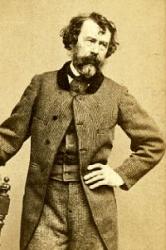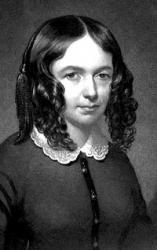Planning worship?
Check out our sister site, ZeteoSearch.org,
for 20+ additional resources related to your search.
- |
User Links
Person Results
‹ Return to hymnal


Export as CSV
Nathaniel Parker Willis

1806 - 1867 Hymnal Number: 324 Author of "They came on" in The Churchman's Treasury of Song Willis, Nathaniel Parker, was born at Portland, Maine, Jan. 20, 1807, and educated at Yale College, graduating in 1826. After writing for a time for the American Monthly Magazine, which he established, and theNew York Mirror, into which the former was merged, he was attached to the American Legation at the French Court. His stay in Europe extended from 1831 to 1837. On his return he became in 1839 one of the editors of The Corsair. His works are numerous, and include Sacred Poems, 1843. He died Jan. 29, 1867. His sister, Mrs. Parton, is the well-known "Fanny Fern." His hymn —"The perfect world by Adam trod" (Dedication of a Place of Worship), was "Written to be sung at the Consecration of Hanover Street [Unitarian] Church, Boston," in 1826, and since then has been widely used, although of no exceeding merit. [Rev F. M. Bird, M.A.]
-- John Julian, Dictionary of Hymnology (1907)
Nathaniel Parker Willis
Hannah More
Hymnal Number: 334 Author of "Since trifles make the sum of human things" in The Churchman's Treasury of Song
Hannah More
Francis Quarles
1592 - 1644 Hymnal Number: 93 Author of "My soul is like a bird, my flesh the cage" in The Churchman's Treasury of Song Quarles, Francis. The life of this "fine old English gentleman" and charming essayist and quaint singer, will be found in full in the present writer's collective and complete edition of his works in verse and prose (3 vols. 4°, 1880-81, Chertsey Worthies’ Library). His father was James Quarles, of Stewards, Esq., and his mother Joan Dalton. He was their third son and child. In the registers of Romford, Essex, is this entry, "1592, May 8. Baptizatus fuit Franciscus filius magistm Jacobi Quarrilus." He lost his father in 1599. His first school was Eomford and his first tutor William Tiehbournc, chaplain of Romford. He lost his mother in 1606. He proceeded to Christ's College, Cambridge, and later was of Exeter College, Oxford. It is to be regretted that the College registers furnish no exact data. He passed from the University to Lincoln's Inn, where his widow-biographer tells us—
"He studied the laws of England; not po much out of desire to benefit himself thereby, as his friends and neighbours (showing therein his continual inclination to peace) by composing suits and differences amongst them."
Some years advance us from 1608 (at Lincoln's Inn) to probably 1612-13, or his 21st year. His widow continues,
"After he came to maturity he was not desirous to put himself into the world, otherwise he might have had greater preferments than he had. He was neither so unfit for Court preferment, or so ill-beloved there, but that he might have raised his fortunes thereby if he had had any inclination that way. But his mind was chiefly set upon his devotion and study; yet not altogether so much but that he faithfully discharged the place of cupbearer to the Queen of Bohemia."
How long Quarles continued with the Queen is unknown. He accompanied Frederick and Elizabeth to Germany. He married Ursely [= Ursula] Woodgate, of St. Andrew's, Holborn, on May 28, 1618. In 1620 appeared the first and most characteristic of his poems, entitled, after the odd phrasing of the period, A Feast for Worms. In the epistle he says, "Wonder not at the title, for it is a Song of Mercy: what greater Feast than Mercy? and what are men but worms" (vol. ii. p. 5). Kindred with the Feast followed Hadassa, or the History of Queene Esther. In 1621 he was in Dublin. He dated hisArgalus and Parthenia," Dublin, 4th March, 1021. "He filled the office of Secretary to the illustrious Ussher, on whose death John Quarles composed a memorable elegy. Ussher wrote to Vossius highly laudatory of our Quarles. His successive books are practically the only landmarks of his remaining years. (The reader is referred to our Life and the Works, ut supra.) The Emblems appeared in 1634-35, and his Hieroglyphics in 1637. In 1639 ho was appointed "Chronologer" of the City of London, an office which he held till his death.
From 1639 his various prose books were written, and became as popular as his poems. They are all in fine English. He was an out and out loyalist, and was with the king at Oxford. He had a numerous family. He died Sept. 8, 1644, and was buried in St. Olave's, Silver Street, London, "11 Sep. 1644." His title to a place in this work rests mainly on his versified Psalms. These appear in the famous Bay Psalter. [See Bay Psalter, p. 119, i.] Quarles's are Psalms xvi., xxv., li., lxxxviii., cxiii., cxxxvii. They were reclaimed by us for Quarles on the authority of John Josselyn's Account of Two Voyages to New England (1674). In the year 1638 he says, on his arrival in Massachusetts Bay,
"Having refreshed myself for a day or two at Noodles Island, I crossed the bay in a small boat to Boston, which then was rather a village than a town, there not being above twenty or thirty houses, and presented myself to Mr. Winthorpe, the Governor, and to Mr. Cotton, the teacher of Boston Church, to whom I delivered from Mr. Francis Quarles, the poet, the translations of Nos. 16,25, 51, 88,113 and 137 Psalms into English metre for his approbation," &c.
These "Psalms" are more curious than successful. But besides them the poetry of Francis Quarles is a virgin field for the capable hymnologist. It is a mystery and a sorrow that few only have been adapted and adopted. There are many of his verse-Emblems that fittingly married to music would be solemn and searching, and nobly displace accepted pious inanities. No. xii. of Book iii. of Emblems (vol. iii. pp. 75, 76), "Oh that Thou wouldst hide me in the grave," deserves a supreme effort of highest genius to mate it worthily. In delightful contrast in its vividness and sweetness is his "Like to the damask rose you see " (vol. iii. p. 285). Equally noticeable are his "Backsliding" (ibid. p. 66, xiv.), "Vain Physicians" (ibid, p. 189, iv.), "Waste not Life" (ibid. p. 194, xi.), "A Little While" (ibid, p. 196, xiv.). [Rev. A. B. Grosart, D.D., LL.D.]
--John Julian, Dictionary of Hymnology (1907)
Francis Quarles
Martin F. Tupper
Hymnal Number: 389 Author of "The waves, the winds of Circumstance!" in The Churchman's Treasury of Song
Martin F. Tupper
Herbert Kynaston
1809 - 1878 Hymnal Number: 215 Author of "Spirit, soul and body's union" in The Churchman's Treasury of Song Kynaston, Herbert, D.D., was born Nov. 23, 1809, and educated at Westminster School, and Christ Church, Oxford (of which he was sometime Student), where he graduated in 1831 (1st class Lit. Hum.). Taking Holy Orders in 1834, he became Head Master of St. Paul's School, London, in 1838; Select Preacher of the University of Oxford, 1842-43; Rector of St. Nicholas-Cole-Abbey, with St. Nicholas Olave, 1850-66; and Prebendary of Holborn in St. Paul's Cathedral, 1853. He died Oct. 1878. His Miscellaneous Poems were published in 1840, and his hymns as follows:—
(1) Occasional Hymns (original and translated), 1862. (2) Occasional Hymns, 2nd series, pt. i., 1864. (3) Occasional Hymns, 2nd series, pt. ii., chiefly on the Miracles, 1866.
These hymns and translations, which are of more than usual merit, have been either strangely overlooked or are unknown to most modern editors. A few were included in the Hymnary, 1872. Dr. Kynaston also contributed to the Guardian from time to time several renderings into Latin of his own hymns, and of hymns by others, but these have not been republished.
--John Julian, Dictionary of Hymnology (1907)
Herbert Kynaston
Elizabeth Barrett Browning

1809 - 1861 Hymnal Number: 308 Author of "Since without Thee we do no good" in The Churchman's Treasury of Song Browning, Elizabeth, née Barrett, daughter of Mr. Barrett, an English country gentleman, and wife of Robert Browning, the poet, was born in London 1809, and died at Florence in 1861. As a poetess she stands at the head of English female writers, and her secular works are well known. Sacred pieces from her works are in common use in America. They include:
1. God, named Love, whose fount Thou art. Love.
2. How high Thou art! Our songs can own. Divine Perfection.
3. Of all the thought of God, that are. Death.
4. What would we give to our beloved? Pt. ii. of No. 3.
5. When Jesus' friend had ceased to be. Friendship. Based on the death of Lazarus.
These hymns are in Beecher's Plymouth Collection 1855; Hedge and Huntington's Hymns for the Church of Christ, Boston, U.S., 1853, &c.
-- John Julian, Dictionary of Hymnology (1907)
=====================
Browning, Elizabeth, née Barrett, p. 187, i. We find that the usually accepted birth-place (London) of Mrs. Browning must be corrected. She was born at Coxhoe Hall, Durham, March 6, 1806, and baptised as Eliza¬beth Barrett Moulton Barrett at Kelloe Church, Durham, Feb. 10, 1808. [Rev. James Mearns. M.A.]
--John Julian, Dictionary of Hymnology, New Supplement (1907)
Elizabeth Barrett Browning
Richard Crashaw
1613 - 1650 Hymnal Number: 122 Author of "Mercy, my Judge, mercy, I cry" in The Churchman's Treasury of Song Crashaw, Richard, son of the Rev. William Crashaw, was educated at the Charter House and Pembroke Hall, and Peterhouse, Cambridge. Of the latter college he became a Fellow, and distinguished himself both in Latin and English poetry. In common with many others he was ejected from his Fellowship for refusing the Covenant. Entering the Roman Communion he went to Paris, seeking preferment. Failing for a time, he was assisted by Cowley, the poet, in 1646, and by him recommended to Queen Henrietta Maria, who was then residing in Paris. Under her patronage he travelled in Italy, and subsequently became a Canon in the Church of Loreto. Died in 1650. Prior to his leaving England he wrote his Steps to the Temple, 1646, in which are given versions of two Psalms; and subsequently The Delights of the Muses. Carmen Deo Nostro was published posthumously in 1652. It contained hymns both original and translated. His Poems were edited by Turnbull, 1856; and by Dr. Grosart in 1869.
--John Julian, Dictionary of Hymnology (1907)
=====================
Crashaw, Richard, p. 268, i. In 1887-8, Dr. Grosart published a Supplement to Complete Works of Richard Cranshaw, containing an "Introductory Note," and 5 additional poetical pieces.
--John Julian, Dictionary of Hymnology, Appendix, Part II (1907)
Richard Crashaw
Alexander Rosse
Hymnal Number: 118a Author of "The pilot's skill how can we know" in The Churchman's Treasury of Song
Alexander Rosse
Alfred Norris
Hymnal Number: 275a Author of "I would not ask Thee that my days" in The Churchman's Treasury of Song
Alfred Norris


 My Starred Hymns
My Starred Hymns

